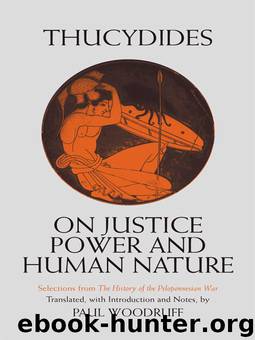On Justice, Power, and Human Nature: Selections from The History of the Peloponnesian War (Hackett Classics) by Woodruff Paul & Thucydides

Author:Woodruff, Paul & Thucydides [Woodruff, Paul]
Language: eng
Format: epub
Publisher: Hackett Publishing
Published: 2010-12-20T16:00:00+00:00
SPEECH OF THE THEBANS
[61] We would not have asked permission to make a speech if these men had given a brief answer to the question, instead of turning against us with an accusation and at the same time defending themselves at length on points that are irrelevant, on which they were not charged, and praising themselves for deeds with which no one has found fault. But as it is we must reply to these accusations and refute their defense, so that neither our ‘wickedness’ nor their ‘glory’ may do them any good. And you should hear the truth about both of these before you decide.
Our quarrel with them arose from this: we founded Plataea
156
after the rest of Boeotia, together with some other places which we had, once we had driven out the mixed peoples who were there; but the Plataeans would not allow us to be their leaders, as had been arranged at the start. Instead, they violated the traditions of their ancestors and took themselves outside the rest of Boeotia; and when we used force against them they went over to the Athenians and together they did us a great deal of harm, for which we made them suffer in return.
157
[62] When the foreign king invaded Greece, they say they were the only Boeotians who did not join the Persians, and this is the point they use to glorify themselves and insult us. Now we admit they did not go over to the Persians, because the Athenians did not; by the same token, however, when the Athenians attacked the rest of Greece, they were the only Boeotians to go over to Athens. But you should consider what forms of government the two cities had when we did these things. Our city at the time happened to be governed neither by an oligarchy that is equally fair for all
158
nor by a democracy. Instead, we had what is most contrary to moderate lawful government, and nearest to tyranny: affairs were in the control of a small clique with absolute power. These few men hoped to increase their personal power even further if the Persian army was victorious, and so they held the majority back by force and brought the Persians in. The city as a whole was not master of itself at the time it did these things, and it does not deserve to be censured for mistakes it made when it was not governed under law.
159
But at least when the Persians were gone and the city had regained its laws, look what happened: once the Athenians moved against the rest of Greece and tried to make themselves masters of our land, and had actually taken many places already with the help of internal divisions [
stasis
], didn’t we fight at Coronea and liberate Boeotia with our victory? And aren’t we now zealously helping to liberate the rest of Greece, and furnishing as many horses and as much other equipment as the other allies put together? That is our defense against the charge that we went over to the Persians.
Download
This site does not store any files on its server. We only index and link to content provided by other sites. Please contact the content providers to delete copyright contents if any and email us, we'll remove relevant links or contents immediately.
| Ancient & Classical | Arthurian Romance |
| Beat Generation | Feminist |
| Gothic & Romantic | LGBT |
| Medieval | Modern |
| Modernism | Postmodernism |
| Renaissance | Shakespeare |
| Surrealism | Victorian |
4 3 2 1: A Novel by Paul Auster(12359)
The handmaid's tale by Margaret Atwood(7737)
Giovanni's Room by James Baldwin(7309)
Asking the Right Questions: A Guide to Critical Thinking by M. Neil Browne & Stuart M. Keeley(5745)
Big Magic: Creative Living Beyond Fear by Elizabeth Gilbert(5733)
Ego Is the Enemy by Ryan Holiday(5400)
The Body: A Guide for Occupants by Bill Bryson(5067)
On Writing A Memoir of the Craft by Stephen King(4923)
Ken Follett - World without end by Ken Follett(4712)
Adulting by Kelly Williams Brown(4557)
Bluets by Maggie Nelson(4539)
Eat That Frog! by Brian Tracy(4505)
Guilty Pleasures by Laurell K Hamilton(4430)
The Poetry of Pablo Neruda by Pablo Neruda(4084)
Alive: The Story of the Andes Survivors by Piers Paul Read(4013)
White Noise - A Novel by Don DeLillo(3998)
Fingerprints of the Gods by Graham Hancock(3981)
The Book of Joy by Dalai Lama(3965)
The Bookshop by Penelope Fitzgerald(3831)
